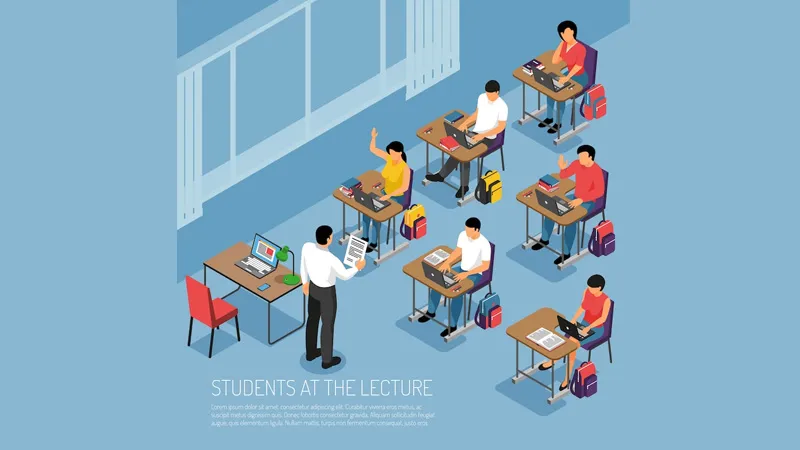Education and Training
How Do You Become a Professor – A Complete Guide to be a Professor
“A good teacher is like a candle—it consumes itself to light the way for others.”– Mustafa Kemal Atatürk
Teaching is still considered one of the most prestigious careers and is known for being a well-respected profession. Being a professor is one of the best careers to follow if you are attracted to the academic world and want to continue your studies in any discipline.
Take up a position as a professor in a college or university if you have a passion for education, research, and the dissemination of concepts and knowledge.
So, how do you become a professor in the UK? What steps are required?
In this article, you will learn the process of becoming a university professor and some of the different professor degrees available to kickstart your career in this profession.
 Are you looking for a competent training course?
Are you looking for a competent training course?
Table of Content
What is a Professor?
A professor is a person who mentors students in a wide range of academic and professional subjects beyond high school. In addition, they conduct research and write and publish academic books.
They have employment at junior or community colleges, professional schools, career, and vocational schools, and public and private colleges and universities.
In the UK, full professors have traditionally held the title “Professor,” while lecturers, senior lecturers, and readers are typically addressed by their academic degrees.
Professors can instruct courses at both the undergraduate and graduate levels as a result. Depending on their interests or the demands of a full-time position at an institution, they may also instruct professional courses.

Advanced Diploma in Teaching Assistant Course Online
What Does a Professor Do?
Professors typically do the following:
- Teach students at the university level a broad range of academic and professional areas.
- Work at professional schools, junior or community colleges, career and vocational schools, public and private colleges and universities.
- Publishing houses where they do research and produce academic articles and books.
- From physics to maths, they instruct students in a wide range of courses.
- Organise classes and assignments.
- Create curricula that conform to departmental and university standards.
- By grading papers and examinations, they monitor students’ progress.
- Offer guidance on which subjects will help them reach their objectives.
- They oversee graduate students pursuing doctoral degrees and carry out research and experiments to increase knowledge in the subject in which they operate.
- They participate in academic and administrative committees that examine and suggest policies.
- Choose the department’s budget and offer recruiting and promotion advice.
How Do You Become a Professor?
There are some requirements you must meet in order to become a professor. The following information will help you understand the role and responsibilities along with the different skills required to become a professor:
Responsibilities of a Professor
As a professor, you’ll need to:
- Conduct lessons, seminars, and lectures.
- Design, prepare, and create lessons, modules, and instructional resources.
- Create and use fresh instructional strategies that take into consideration a developing body of knowledge.
- Review students’ academic work.
- Arrange, grade, and supervise tests and evaluations.
- Guide student research projects, such as master’s or PhD dissertations or final year undergraduate projects.
Manage your own research team, which often consists of PhD and Master’s students as well as research assistants (postdocs). - Work in a pastoral or advising role for students.
- Have articles published in peer-reviewed journals and actively advance the scientific reputation of your organisation.
- Prepare research for publishing by writing it up.
- Do research, create, and ready bid and proposals to attract outside funds to your department for various research projects.
- Perform administrative duties for the department, including participation in committees and boards, student admissions, and induction programmes.
- Participate in professional seminars and conferences in your area of expertise.
- Create partnerships with other institutions, as well as with private, public, and nonprofit organisations, and engage in staff development initiatives.
Skills Required for a Professor
Apart from good teaching skills, there are many other skills that a professor should possess in order to excel in the profession.
According to Eraldo Banovac, “A great professor considers his student’s success as a reflection of his own. He will not remain indifferent in the case of continuous poor exam results but will do as much as possible to overcome such a situation.”
Having the following skills can help you succeed as a professor:
Communicate
- Speak clearly so that the listener can understand.
- Read and understand materials that are related to your activity.
- Understand written material.
- Understand spoken information.
- Write clearly so that readers can understand.
- Pay attention to others and question.
Reason and Problem Solve
- Analyse concepts logically to find their advantages and disadvantages.
- Studying and working with new information or materials will help you understand them.
- Combine various pieces of knowledge and draw conclusions.
- Apply logic to find solutions to issues.
- Recognize the kind of issue at hand.
- Consider the benefits and drawbacks of potential actions.
- Follow the rules to organise things or do things in a certain order.
- Create fresh thoughts on a subject.
- Create guidelines that categorise things in different ways.
- Consider unique, uncommon, or imaginative solutions to issues.
- Recognize when major changes in a system have occurred or are likely to occur.
- Decide what must be changed in order to achieve goals.
Manage Oneself, People, Time, and Things
- Evaluate how well you are learning or doing something.
- Manage both your own and other people’s time.
Work with People
- Share your knowledge with others.
- Use a number of teaching and learning techniques.
- Observe other people’s reactions and consider their possible causes.
- Change behaviour in response to others’ actions.
How to Become a Professor?
Professors can instruct in a wide range of areas, but they often go through a similar process to become qualified. Education and becoming recognised as an authority on a subject are the main goals of academic careers. When making plans to fulfil your dream of becoming a professor, use the following steps as a guide:
Educational Qualifications to be a Professor
Here are the educational qualifications to become a professor:
1. Earn a bachelor’s degree.
Apply to a college or university and earn a bachelor’s degree before continuing higher education.
You can choose the subject you want to focus on during your undergraduate study. Even if you plan to develop your expertise after getting a postgraduate degree, you should choose a major that is related to the subject you want to teach in the future.
Focus on developing a great application for graduate studies while completing your bachelor’s degree by working closely with professors and finishing research projects.
2. Earn a master’s degree or PhD.
Many people in the UK often ask about “how to get the title professor?” You must first earn a PhD in your area of expertise in order to gain the title of professor. You also need a Master’s and an undergraduate degree to be qualified for a PhD.
Start a graduate programme search once you have chosen a more focused subject. Choose a graduate programme with a strong reputation, engaging courses, and the lecturers you want to work with. You’ll likely finish one or more significant thesis projects that show your subject-matter expertise during your postgraduate studies.
Assistantship
Students interested in becoming professors should take part in their school’s assistantship programme during their graduate years.
An assistantship is a type of financial help that allows students to receive full or partial tuition remission and a stipend while gaining work experience under the supervision of a professor.
When they take on an assistantship, some students can also be qualified to receive graduate credit hours toward their degree. Other assistantships may involve instructional or teaching-related tasks, such as marking or grading scripts, projects, and assignments or giving lectures in class.
You get experience through assistantship programmes, particularly in the field of education. Because a minimum grade point average must be met before accepting an assistantship position, the programmes also help maintain students’ GPAs.
Top Courses of this Category
Salary and Benefits
Academic salaries can vary widely depending on rank, country, and institution. So, how much do university professors make in the UK?
- According to Prospects depending on your level of expertise and leadership responsibilities, salaries at the professorial level can exceed £100,000.
- Senior lecturer salaries typically range from £39,152 to £59,135, depending on the institution and your background.
- Higher education (HE) teachers typically earn between £33,797 and £49,553 per year, depending on the institution and their level of experience.
Work Environment
Professors spend their days indoors, in libraries, offices, meeting spaces, and research facilities. While at work, they mostly sit, with the possible exception of when they are teaching and need to stand for long periods of time.
The working hours of professors are generally flexible. They are required to hold a set number of office hours each week, maintain a specific number of classroom teaching hours during the workweek, and attend committee meetings as necessary.
Usually, professors are free to plan their own hours for conducting research, grading papers, and preparing for classes. In addition, college professors get many holidays off and only a light workload, or none at all, during the summer.
FAQ
How long does it take to become a professor?
According to Indeed, it requires at least eight years of higher education and is a means of ensuring that professors are well-versed in the subject they teach.
Can you be a professor without a PhD?
No. Without a PhD, it is not possible to become a professor.
Is a professor higher than a doctor?
Yes. It is generally accepted that a professor has a higher academic rank than a doctor.
Who is the youngest professor in the world?
The Guinness World Record for the youngest professor is held by Alia Sabur.
Can you be a professor without teaching?
Yes. It’s possible to be a professor without teaching.
How many hours do professors work?
Despite having a 35-hour workweek, you’ll probably work longer hours, especially on the weekends and in the evenings, to make time for your own research, marking, outreach work, open days, student supervision, and administrative duties.
Is being a professor a good career?
Yes. Being a professor is a rewarding career.
Do I need a PhD to be a professor?
Yes. To become a professor, you will need a PhD degree.
What does a professor do?
A professor is a professional who teaches students after the high school level, does research, and publishes materials related to their area of expertise.
Is it difficult to become a professor?
It’s not that difficult, in my opinion. To become a professor, you need to earn a PhD with honours from a top university, complete many years of post-doctoral study, be given tenure as a department lecturer, and publish a large number of seminal papers in your field.
Conclusions
If you love learning and teaching, becoming a professor is a perfect career for you. Your career path will be exciting and demand a long-term dedication to writing, research, and publication, in addition to professional teaching and research capabilities.
You can achieve it if you know how to get ready for this role and improve your chances of landing a job, even though it may take years of devotion and hard work. We hope the above guide will help you to quickly pursue your chosen career and provides an answer to your question of “how do you become a professor?”.
What to Read Next:














